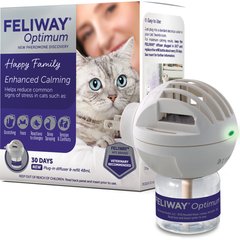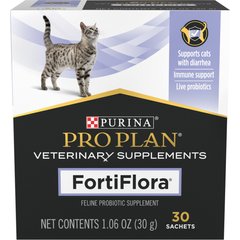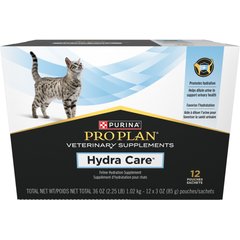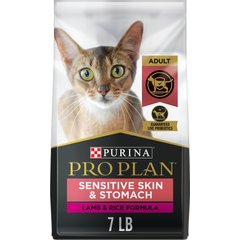Postpartum Low Blood Calcium in Cats
Postpartum Eclampsia in Cats
Eclampsia is a deficiency of blood calcium (hypocalcemia) that develops in the weeks after giving birth, although it may develop prior to birth or during lactation. Also called "milk fever," eclampsia is usually due to an underactive parathyroid gland, the gland that is responsible for regulating the parathyroid hormone, which in turn regulates the amount of calcium that is stored in the bones, to be removed as needed for use in the blood. As the parathyroid gland has not being signaled to stimulate the parathyroid hormone to release calcium from the bones into the body, when the nursing queen's milk comes in and the demand for calcium suddenly increases, the parathyroid gland is unable to respond quickly enough for her needs to be met. The lack of calcium results in tonoclonic contractions of the skeletal muscles, where the muscles in the body contract convulsively, limiting movement.
Kittens are often not affected by eclampsia because their nutritional needs, including calcium, are being taken care of by their mother. In addition, symptoms in the nursing queen typically become apparent in the first 40 days after giving birth.
Symptoms and Types
- Poor maternal behavior
- Restlessness, nervousness
- Disorientation
- Panting, whining
- Vomiting
- Diarrhea
- Clumsy walking, stiff gait
- Facial itchiness
- Muscle tremors, tetany (entire body goes stiff), convulsions
- Cat lies down with paws rigidly extended (usually seen 8–12 hours after the first onset of symptoms)
- High body temperature, fever over 105 degrees Fahrenheit
- Rapid, heavy breathing
- Dilated pupils which are slow to contract when exposed to light
Vet Recommended Health Support
- Feliway Optimum Enhanced Calming 30 Day Diffuser for Cats$29.99Chewy Price
- Purina Pro Plan Veterinary Diets FortiFlora Powder Probiotic Digestive Supplement for Cats, 30 count$30.99Chewy Price
- Purina Pro Plan Veterinary Diets Hydra Care Liver Flavored Liquid Supplement for Cats, 3-oz pouch, case of 12$14.99Chewy Price
- Purina Pro Plan Adult Sensitive Skin & Stomach Lamb & Rice Formula Dry Cat Food, 7-lb bag$28.08Chewy Price
Causes
- Calcium supplementation during pregnancy
- Inappropriate calcium to phosphorous ratio in the diet while pregnant
- Poor nutrition during pregnancy
- First litter
Diagnosis
You will need to provide a thorough history of your cat's health leading up to the onset of symptoms. Make sure to provide your veterinarian with the type of pregnancy supplement you have been giving to your cat, and details of the diet you have been feeding her.
Standard tests will include a chemical blood profile, complete blood count and an electrolyte panel. As soon as the electrolyte panel is ready, the total serum calcium will be verified by a blood test. If the concentration is less than 7 mg/dL, your cat will be diagnosed with eclampsia and will be given calcium supplementation immediately. Low blood sugar and low blood magnesium levels may also be present. These can also be supplemented. Serum potassium is high in 56 percent of cases. An electrocardiogram (ECG) showing the heart's electrical rhythm will often be abnormal.
Treatment
This is a serious and potentially life-threatening condition, but it can be treated quickly and the cat's health stabilized if she is treated as soon as symptoms become apparent. If your cat has a high fever, your veterinarian will try to cool her down with a cool water soak and fan to bring the body temperature down to a normal range. Your veterinarian will treat your cat with intravenous calcium until her levels have increased to a safe level, and until her body alone is able to maintain calcium levels.
Your veterinarian will advise you to take the kittens away to prevent them from nursing, to be hand fed with a commercial milk for 24 hours, or until the queen's serum calcium is stabilized. If, after the mother stabilizes, you opt to let the kittens continue nursing, you will need to return to your veterinarian to monitor calcium levels in your cat's blood. Depending on whether her body is able to begin producing sufficient amounts of calcium on its own, she may need to remain on calcium supplements for some time. Your doctor will determine this.
Living and Management
If the kittens are not hand-raised and continue to nurse, it is very likely that your cat will need to be given calcium supplements for the duration of the nursing period, until the kittens have been weaned. Her serum calcium levels will need to be monitored frequently through the nursing period. Ensuring that she eats a diet containing a 1 to 1 or 1 to 2 calcium to phosphorus ratio, before pregnancy and during pregnancy, will help to prevent eclampsia with future litters.
Calcium supplementation must also be avoided while your cat is pregnant, unless specifically prescribed by your veterinarian. Also advised is avoiding high phytate foods, such as soybean mean, barley, rice, wheat bran and wheat germ, as high phytate foods can interfere with the body's absorption of calcium.



